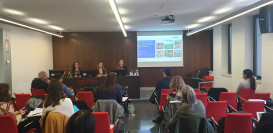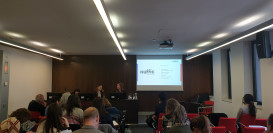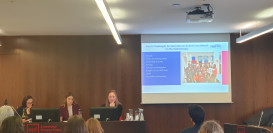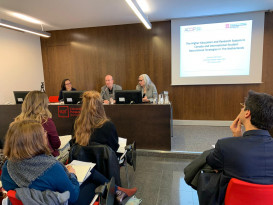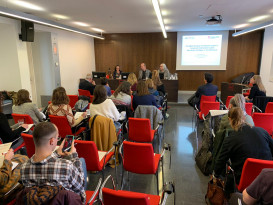ACUP and CIC prepare to attend the APAIE 2020 international fair
About 30 representatives from universities of Catalonia participated at the informative session on Canada's higher education and research system on February 20th and the trends and strategies for attracting students underway in Canada and The Netherlands.
The Catalan Association of Public Universities (ACUP) and the Inter-University Council of Catalonia (CIC) held a seminar on Canada's university and research system to prepare for their participation in the Asia-Pacific Association for International Education (APAIE). This year it will take place in Vancouver (Canada) from March 22nd to 25th. For the seventh consecutive year, the Catalan university system will have its own booth at one of the largest university fairs in the world and the largest in Asia-Pacific.
The seminar was held on the Poblenou Campus of the Pompeu Fabra University (UPF) and began with the welcome words of Isabel Valverde, Vice President for Internationalization Projects at Pompeu Fabra University (UPF) and Josep M Vilalta, ACUP´s Executive Secretary.
The first presentation was given by Cindy McIntyre, Deputy Director of International Relations at Universities Canada, who through a live video conference gave an overview of Canada's higher education and research system. McIntyre described the tasks done by the organization "Universities Canada" and announced the main trends, policies and priorities of the Canadian system in relation to internationalization.
Next, Anne Christensen, director of development and partnerships at the Canadian Bureau for International Education (CBIE), described the organization's important task and emphasized the following internationalization trends: growing global competition, the importance of institutional systems that support internationalization policies, the importance of inclusion, sustainability in international education and internationalization at home.
Furthermore, a part of the seminar was dedicated to the specific topic of student recruitment strategies in The Netherlands (by Sabrina Verheul, from Nuffic) and Anne Christensen. The two agreed that the greatest challenges facing higher education systems and universities are diversity, public and political debates, quality assurance, accommodation, inclusion and integration, budget issues, data protection laws and other regulations and regulations. They also agreed that it is important to distinguish between undergraduate and graduate students and to take into account the institutional profile and the location of the universities.
Right now, the countries with the highest number of students attending a university outside their home country are Bangladesh, Iran, Vietnam, Colombia, India, Philippines and Kenya.
They also agreed that some of the "lessons" learned or counseled in this area would be to create an international identity, understand particular contexts, differentiate, be flexible, build collaborations and alliances, and make sure that the institution is prepared to welcome international students and to emphasize career and career opportunities.
Finally, Alain Roy, Vice President for International Partnerships at Institutes and Colleges Canada, presented his work in vocational and technical education, explaining current trends in the demand for certain skills and competencies, the academic-industry connection, lifelong learning and internationalization, and emphasized that there is much room for collaboration between Canada and Spain.
In conclusion, Lluís Baulenas, Secretary General of the Inter-University Council of Catalonia (CIC) thanked all the speakers and attendees and emphasized the importance of these seminars that have been held for 5 years now.
Sara López, head of international relations at Pompeu Fabra University, moderated the event.
